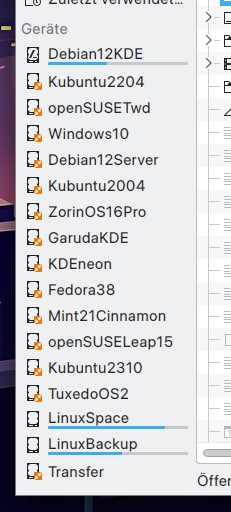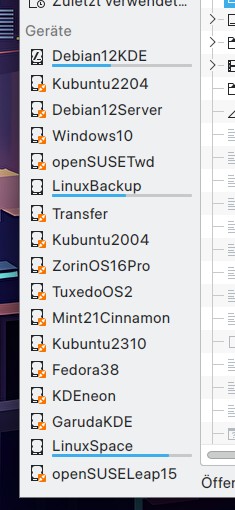@meven : I know you did not mean me, but in my case the “hot pluggable” setting in the computers’ firmware makes no difference in the behaviour of Dolphin - whether I set them to “hot pluggable” or “not hot pluggable” (and they are not mounted in an external rack or something but are run-of-the-mill internal SATA SSDs).
I was also able to simulate Dolphin changing the display order of partitions (when e.g. sda, the internal SSD connected to SATA port 1, becomes sdb and vice versa) on different computers.
I cannot reproduce if this also happens with e.g. M.2 NVMe drives, though, as I only have one port for them in my most modern machine. 
I think that could have something to do with the distribution one uses.
Additional observation: I was mostly able to recreate this with Debian 12 and openSUSE Tumbleweed (my main systems apart from Kubuntu and TUXEDO OS) - but not once in one of the Ubuntu-based system. I guess Canonical has done something to the boot process that prevents e.g. sda becoming sdb and vice versa…
So I have had the time to alter my /etc/fstab today:
# <file system> <mount point> <type> <options> <dump> <pass>
# / was on /dev/nvme0n1p4 during installation
UUID=f1844df8-1db6-4192-8eaa-37b1d6e488a9 / ext4 noatime,errors=remount-ro 0 1
# /boot/efi was on /dev/nvme0n1p1 during installation
UUID=7DF1-DC9C /boot/efi vfat umask=0077 0 1
/dev/sr0 /media/cdrom0 udf,iso9660 user,noauto 0 0
# setting swap to /dev/nvme0n1p6 after installation
UUID=8e9f45cf-b1d1-4707-8e2d-a61b02d0a412 none swap pri=10 0 0
# setting second swap to /dev/sdb5 after installation
UUID=0459ee56-023e-4014-b87b-a23a98913838 none swap pri=5 0 0
# setting third swap to /dev/sda13 after installation
UUID=347ac71b-c49e-440f-8f9e-947053eba097 none swap defaults 0 0
# automount LinuxSpace (/dev/sda12)
UUID=7ec215a7-d052-452d-ae2d-33431e54822d /mnt/LinuxSpace ext4 noatime,defaults,nofail 0 2
# automount LinuxBackup (/dev/sdb3)
UUID=e1de1cd0-5c44-48cc-842c-7f33be81fdf6 /mnt/LinuxBackup ext4 noatime,defaults,nofail 0 2
#
# added for "Dolphin test"
# <file system> <mount point> <type> <options> <dump> <pass>
UUID=4b536b29-d4d2-48e2-9ae6-969e2dc26e5d /mnt/test/Debian12Server ext4 noatime,noauto 0 0
UUID=06b790b3-a550-4fd8-8c58-14cd9b4def4d /mnt/test/Kubuntu2004 ext4 noatime,noauto 0 0
UUID=5b500c7a-1361-4dd5-baeb-e114c2bcc562 /mnt/test/ZorinOS16Pro ext4 noatime,noauto 0 0
UUID=5c1fb964-63df-4ad1-9574-ccf9301306e6 /mnt/test/GarudaKDE btrfs noatime,noauto 0 0
UUID=a35618a9-6db5-4495-a8cf-722c4ffe4b2a /mnt/test/KDEneon ext4 noatime,noauto 0 0
UUID=9f109b8a-8831-4460-8747-2e4ce70f5f5e /mnt/test/Fedora39 ext4 noatime,noauto 0 0
UUID=078aeb8b-5926-4ca3-838a-0eea68bb9813 /mnt/test/Mint21Cinnamon ext4 noatime,noauto 0 0
UUID=fca7240a-eadf-4b04-951c-90401e9c4312 /mnt/test/openSUSELeap15 btrfs noatime,noauto 0 0
UUID=9c9b3b53-09d3-4960-84be-a9ae43762e96 /mnt/test/Kubuntu2310 ext4 noatime,noauto 0 0
UUID=2f08f381-da45-40e0-be7c-8136843833f8 /mnt/test/TuxedoOS2 ext4 noatime,noauto 0 0
UUID=d502d59d-8d03-4b5d-9923-4476e3456f7b /mnt/test/openSUSETwd btrfs noatime,noauto 0 0
UUID=77D1-78D4 /mnt/test/Transfer exfat noauto,user 0 0
UUID=EC2A1FA52A1F6C38 /mnt/test/Windows10 ntfs-3g noatime,noauto 0 0
UUID=115cab55-7092-4735-8dc7-cf20b3dfbe63 /mnt/test/Kubuntu2204 ext4 noatime,noauto 0 0
Without the additions in the lower part of /etc/fstab Dolphin would mount a partition in /media/$USER/name_of_partition (when I click on its entry in the “Devices” section).
With those additions it now mounts them in /mnt/directory_in_fstab.
Unfortunately those additions in my /etc/fstab had zero effect on how Dolphin sorts (and changes the display order of) the partitions in the “Devices” section, if e.g. sdb, connected to SATA port 2, and sda, connected to SATA port 1, exchange their names during the boot process (meaning /dev/disk/by-path changes during boot).
So back to square one…?
![]()

